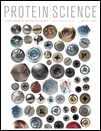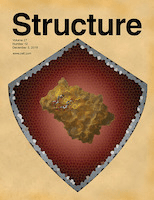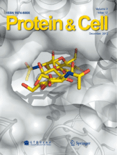
PROTEIN SCIENCE
Scope & Guideline
Driving Innovation in Molecular Biology and Medicine
Introduction
Aims and Scopes
- Protein Structure and Dynamics:
Research dedicated to elucidating the three-dimensional structures of proteins and their dynamics in various environments, often using techniques like X-ray crystallography, NMR spectroscopy, and cryo-electron microscopy. - Protein Engineering and Design:
Innovative methods in designing and engineering proteins for specific functions, including the development of novel enzymes, therapeutic proteins, and biosensors. - Protein-Protein Interactions:
Studies focusing on the interactions between proteins, including binding mechanisms, allosteric regulation, and the impact of post-translational modifications on these interactions. - Proteomics and Functional Studies:
Comprehensive explorations of protein expression profiles, modifications, and interactions within biological systems, often utilizing mass spectrometry and bioinformatics. - Disease Mechanisms and Therapeutic Targets:
Research elucidating the role of proteins in diseases, including neurodegenerative conditions and cancer, and the identification of potential therapeutic targets. - Computational Biology and Modeling:
Use of computational methods, including machine learning and molecular dynamics simulations, to predict protein structures, interactions, and dynamics. - Phase Separation and Biomolecular Condensates:
Investigating the role of protein phase separation in cellular processes and the formation of membraneless organelles.
Trending and Emerging
- Protein Phase Separation:
There is a significant increase in research exploring the phenomenon of liquid-liquid phase separation of proteins and its implications for cellular organization and function. - Machine Learning in Protein Science:
The integration of machine learning techniques for predicting protein structure, dynamics, and function is on the rise, showcasing the intersection of computational methods with experimental biology. - Post-Translational Modifications:
Investigation into the effects of post-translational modifications on protein function and stability is trending, reflecting an increased interest in how these modifications influence disease mechanisms. - Therapeutic Protein Engineering:
Emerging research is focusing on the design and engineering of therapeutic proteins, including novel biologics and biosensors, driven by the need for innovative treatment strategies. - Interdisciplinary Approaches:
There is a growing trend towards interdisciplinary research that combines structural biology, biochemistry, and computational techniques to address complex biological questions. - SARS-CoV-2 Research:
Research related to SARS-CoV-2, including protein interactions and therapeutic targeting, has surged, reflecting the global health crisis and the urgency of developing effective treatments.
Declining or Waning
- Traditional Biochemical Assays:
There appears to be a waning interest in traditional biochemical assays, as researchers increasingly turn to high-throughput and computational methods for studying protein interactions and functions. - Static Structural Studies:
The emphasis on static structural studies, while still relevant, has diminished compared to dynamic studies that explore protein flexibility and interactions in real-time. - Single-Domain Antibody Research:
Research focused on single-domain antibodies has seen a decrease, possibly due to the saturation of findings in this area and the growing interest in bispecific and multifunctional antibodies.
Similar Journals

ELECTROPHORESIS
Driving Insights in Clinical BiochemistryELECTROPHORESIS, published by Wiley, stands as a premier journal dedicated to advancing the field of analytical chemistry, biochemistry, and clinical biochemistry. With an ISSN of 0173-0835 and an E-ISSN of 1522-2683, this journal has been a vital resource since its inception in 1980 and is poised to continue its journey through to 2024. Operating out of Germany, it holds a significant standing in the academic community, featuring in the Q2 category for Analytical Chemistry and in the Q3 tier for both Biochemistry and Clinical Biochemistry as of 2023. The journal ranks impressively within Scopus, occupying the 43rd position out of 156 in Analytical Chemistry and the 44th spot out of 117 in Clinical Biochemistry, ensuring its relevance and impact in these disciplines. Although it does not currently offer open access, ELECTROPHORESIS remains an essential publication for researchers, professionals, and students seeking cutting-edge insights and developments that influence the methodologies and technologies underpinning electrophoretic techniques.

Journal of Structural Biology-X
Bridging Disciplines Through Open Access ResearchThe Journal of Structural Biology-X, published by Elsevier, is a leading open-access journal dedicated to advancing the field of structural biology. Launched in 2019, it has quickly established itself as a vital resource for researchers, professionals, and students, boasting a prestigious Q1 ranking in Structural Biology for 2023 and achieving an impressive Scopus rank of #19 out of 49 in the biochemistry, genetics, and molecular biology category. With an E-ISSN of 2590-1524, this journal emphasizes accessibility and collaboration by providing open access to its comprehensive collection of research articles, reviews, and cutting-edge methodologies. The scope of the journal encompasses significant themes within structural biology, including protein structure, molecular interactions, and imaging techniques, facilitating interdisciplinary dialogue and innovation. Join the global community of scientists and contribute to the body of knowledge that propels our understanding of molecular architecture through the Journal of Structural Biology-X.

JOURNAL OF MOLECULAR BIOLOGY
Charting the Course of Molecular Research ExcellenceThe Journal of Molecular Biology (ISSN: 0022-2836, E-ISSN: 1089-8638), published by Academic Press Ltd - Elsevier Science Ltd, stands as a premier platform for disseminating significant advancements in the field of molecular biology. With a distinguished history of publication spanning from 1959 to 2024, this journal is recognized for its high-quality, peer-reviewed articles that engage with transformative research in biophysics, structural biology, and molecular biology. The journal holds an impressive Q1 category ranking across these disciplines in 2023, affirming its impact and relevance within the scientific community. Notably, it ranks #11 in biophysics and #5 in structural biology based on Scopus metrics, placing it in the 93rd and 90th percentiles, respectively. As an essential resource for researchers, professionals, and students alike, the Journal of Molecular Biology serves as a vital conduit for the exchange of innovative ideas and discoveries, fostering a deeper understanding of life's molecular underpinnings.

PROTEINS-STRUCTURE FUNCTION AND BIOINFORMATICS
Advancing Knowledge in Biochemistry and BeyondPROTEINS - STRUCTURE FUNCTION AND BIOINFORMATICS, published by WILEY, is a leading journal in the fields of biochemistry, molecular biology, and structural biology, recognized for its significant contribution to protein research since its inception in 1986. With its impressive rankings in the Q1 category for Biochemistry and Q2 for both Molecular Biology and Structural Biology in 2023, the journal serves as an essential resource for researchers and professionals seeking to explore the intricate relationships between protein structures and their functions. The journal, based in the United States, operates without an Open Access model, ensuring a curated selection of high-quality peer-reviewed articles that drive innovation and collaboration in the scientific community. Engaging with the robust content of PROTEINS not only bolsters academic scholarship but also opens avenues for groundbreaking discoveries that are pivotal in the advancing field of bioinformatics.

Current Proteomics
Exploring Innovations in Proteomic DiscoveriesCurrent Proteomics is a distinguished journal dedicated to the dynamic field of proteomics, offering researchers and professionals a platform to disseminate innovative findings and comprehensive reviews. Published by Bentham Science Publishers Ltd, this journal caters to a global audience and serves as an essential resource for students, academics, and industry experts interested in advances in biochemistry and molecular biology. With an ISSN of 1570-1646 and an E-ISSN of 1875-6247, the journal has established itself in various research categories, achieving a Q4 ranking in both Biochemistry and Molecular Biology as of 2023. While the impact factor and H-index data are not specified, its Scopus ranking reflects a competitive position in its fields, with percentiles in the 12th to 16th range. Although not an open-access journal, Current Proteomics is vital for fostering ongoing dialogue and collaboration in proteomic research, encouraging contributions that explore cutting-edge methodologies and applications. Researchers are invited to share their insights and contribute to this evolving discipline, thus enhancing the collective understanding of proteomics within the scientific community.

Molecular Cell
Connecting Molecular Genetics with Cellular Functionality.Molecular Cell, published by Cell Press, is a leading journal in the fields of cell biology and molecular biology. Established in 1997, this prestigious journal boasts a significant impact within the scientific community, evidenced by its impressive 2023 Scopus rankings, placing it in the top 2% of its field (Rank #10/410 in Molecular Biology, Rank #12/285 in Cell Biology). With a focus on cutting-edge research that bridges the gap between molecular genetics and cellular function, Molecular Cell serves as an essential platform for the dissemination of vital findings and innovative methodologies. Although it follows a traditional publishing model without Open Access options, its rigorous peer-review process and high standards ensure that articles published within these pages are of the utmost quality, making it an invaluable resource for researchers, professionals, and students alike seeking to stay at the forefront of scientific discovery. The journal's address is 50 Hampshire St, Floor 5, Cambridge, MA 02139, United States, reinforcing its commitment to fostering scientific excellence and collaboration.

STRUCTURE
Advancing the frontiers of structural and molecular biology.STRUCTURE is a premier academic journal published by CELL PRESS, dedicated to advancing the field of structural biology and molecular biology since its inception in 1993. With an impressive reputation, it is recognized as a Q1 journal in both Molecular Biology and Structural Biology categories, reflecting its high impact within the academic community. The journal holds a significant position in Scopus rankings, placing 10th among 49 in Structural Biology and 100th among 410 in Molecular Biology, marking it as a key resource with a strong influence on ongoing research. Researchers and professionals alike will find STRUCTURE an invaluable platform for disseminating cutting-edge findings related to protein structure, dynamics, and interactions, fostering insights that can lead to groundbreaking applications in medicine and biotechnology. Although the journal follows a traditional subscription model, it continues to attract a diverse array of submissions, ensuring a vibrant exchange of knowledge in the ever-evolving landscape of structural and molecular biology. Access to its content can enhance the understanding of intricate biological mechanisms, making it essential reading for experts, students, and anyone passionate about the molecular underpinnings of life.

Protein & Cell
Unveiling Innovations in Drug Discovery and BiotechnologyProtein & Cell, published by Oxford University Press, is a distinguished international journal focusing on cutting-edge research in the fields of biochemistry, biotechnology, cell biology, and drug discovery. This open access journal, active since 2014, is dedicated to disseminating innovative findings that advance our understanding of protein functions and cellular processes, making it an essential resource for researchers, professionals, and students alike. With an impressive 2023 impact factor reflected in its Q1 ranking across multiple categories such as Biochemistry, Drug Discovery, and Cell Biology, 'Protein & Cell' stands at the forefront of scientific research, driving collaboration and discussion in the scientific community. Researchers can access the journal freely online, fostering a global exchange of knowledge and contributing to significant advancements in medicine and biotechnology. Located in the United Kingdom, the journal strives to be a pivotal platform for impactful research that influences future studies and applications.

PROTEOMICS
Shaping the future of life sciences through proteomic research.PROTEOMICS is a leading journal focused on the rapidly evolving field of proteomics, published by WILEY in Germany. With a solid reputation established since its inception in 2001, it has continually contributed to the understanding of protein functions and interactions within biological systems. As part of its commitment to academic excellence, PROTEOMICS is ranked in the second quartile for both Biochemistry and Molecular Biology categories (2023), reflecting its significant influence in advancing research in these areas. Although it does not currently provide open access options, it remains a vital resource for researchers, professionals, and students keen to explore innovative methodologies and findings in proteomic research. By publishing groundbreaking studies that bridge theoretical knowledge with practical applications, PROTEOMICS plays a crucial role in enhancing our understanding of molecular processes and driving forward advancements in the life sciences.

TRENDS IN BIOCHEMICAL SCIENCES
Navigating the Evolving Landscape of BiochemistryTRENDS IN BIOCHEMICAL SCIENCES is a premier academic journal published by CELL PRESS, focusing on the latest advancements and insights in the dynamic fields of biochemistry and molecular biology. With an ISSN of 0968-0004 and an E-ISSN of 1362-4326, this journal has established itself as a leading source of high-impact research, boasting an impressive Q1 category ranking in both Biochemistry and Molecular Biology as of 2023. The journal's Scopus Ranks further highlight its significance, placing it in the top 3% and 4% of its respective fields, emphasizing its role as a vital platform for disseminating innovative research. Published since 1976 and continuing through 2024, TRENDS IN BIOCHEMICAL SCIENCES provides a comprehensive overview of the latest trends, methods, and applications, helping researchers, professionals, and students stay at the forefront of their disciplines. Although it offers traditional access options, the journal's rich content and authoritative analysis make it a must-read for those pursuing cutting-edge biochemical research.